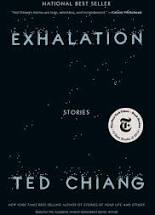Right Stories, Wrong Time?
Determined to unplug for a short spell, I recently sat down with Ted Chiang’s latest collection of short stories, Exhalation. Chiang is an extremely talented writer, perhaps best known for “The Story of Your Life”, which was the basis for the movie Arrival. He has garnered several awards, too; he is an author that we’ll be reading for many years.

Chiang is sometimes described as a fiction writer and sometimes as a science fiction writer. One can be both of course – and fitting within a genre’s expectations is no recipe for success. My interest was piqued by curiosity and convenience. When one shelters in place, tethered to phones and screens, maintaining long-term focus can be a challenge. I thought that short stories were a safe hedge in a time when focus can be elusive.
Turns out that my plan was both wrong and right.
The stories in Exhalation are well-written and creative. Chiang is a writer who is interested in an idea, a speculation, and from that spins a tale. His ideas, too, are mostly very intriguing. Themes of free will, cognition, meta-cognition and what it means to be human are recurring questions that drive these stories. Chiang explores them with focus and clarity. There are no tricks, no narrative sleight-of-hand gimmicks, or even experiments with the prose itself. Instead, he writes with sense of purpose. It is though he wants to sort something out.
All well and good, and yet, I found myself less than fully engaged in the book while reading it. While I liked the ideas and found them provocative, there was little about the stories that stuck. Initially, I had difficulty figuring out why. I re-read, skimmed, and started to obsess, ever so mildly, about why I wasn’t all that engaged. Bear in mind, too, that I clearly was engaged since I was thinking about the stories quite a bit. It took some time to gather what was going on.
Chiang, I propose, is more focused on his ideas than plot, and more interested in plot than the development of his characters. His ideas are consistently intriguing. His plots are mostly strong. His characters, on the other hand, are less than fully developed. Chiang, to my reading, does not give them love or even all that much care. More often than not they seem to be vehicles for delivering his ideas.
Had Chiang stayed within the strictures of genre – hero/antihero; boy meets girl, loses girl, gets girl; stranger comes to town – the thinness of his characters would not be noticed. Without the well-worn clothing of genre, however, all aspects of the story are equally exposed. My reading was, as a consequence, probably more intense than necessary. Engagement indeed! Added to that, of course, that I’m reading them in a time of social distancing. My underlying hope was not to find ideas; it was connection, the kind of connection that can only come through fiction.
Exhalation is a thought-provoking collection of short stories that I’m confident will make you think. However, I am equally confident that I cannot predict what it will make you think about.
David Potash